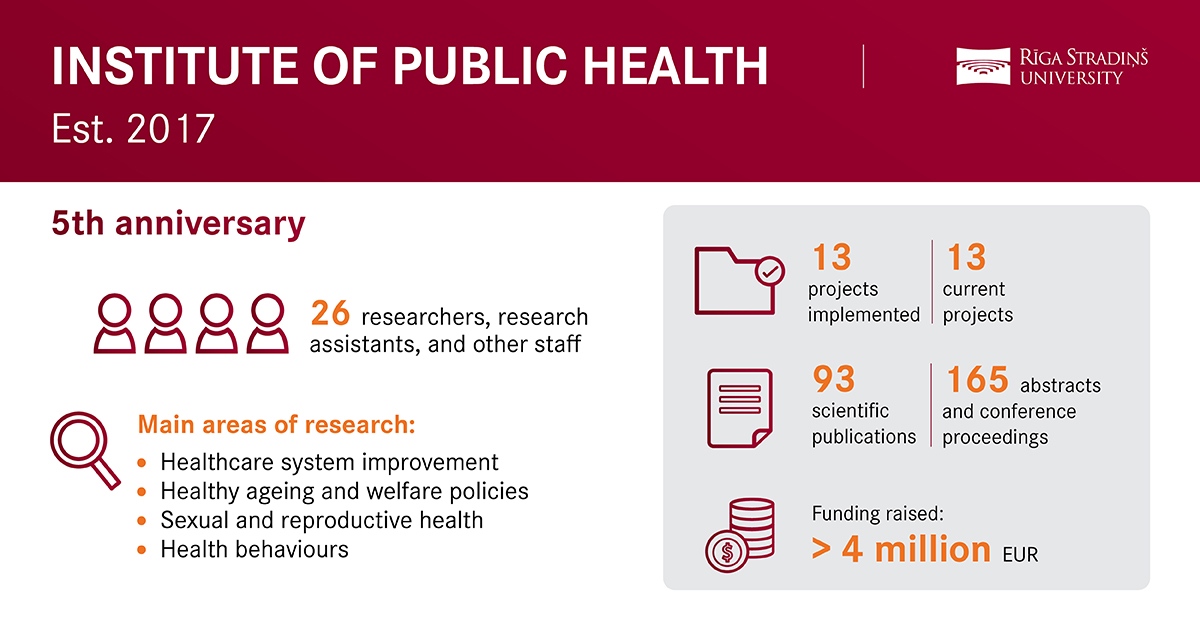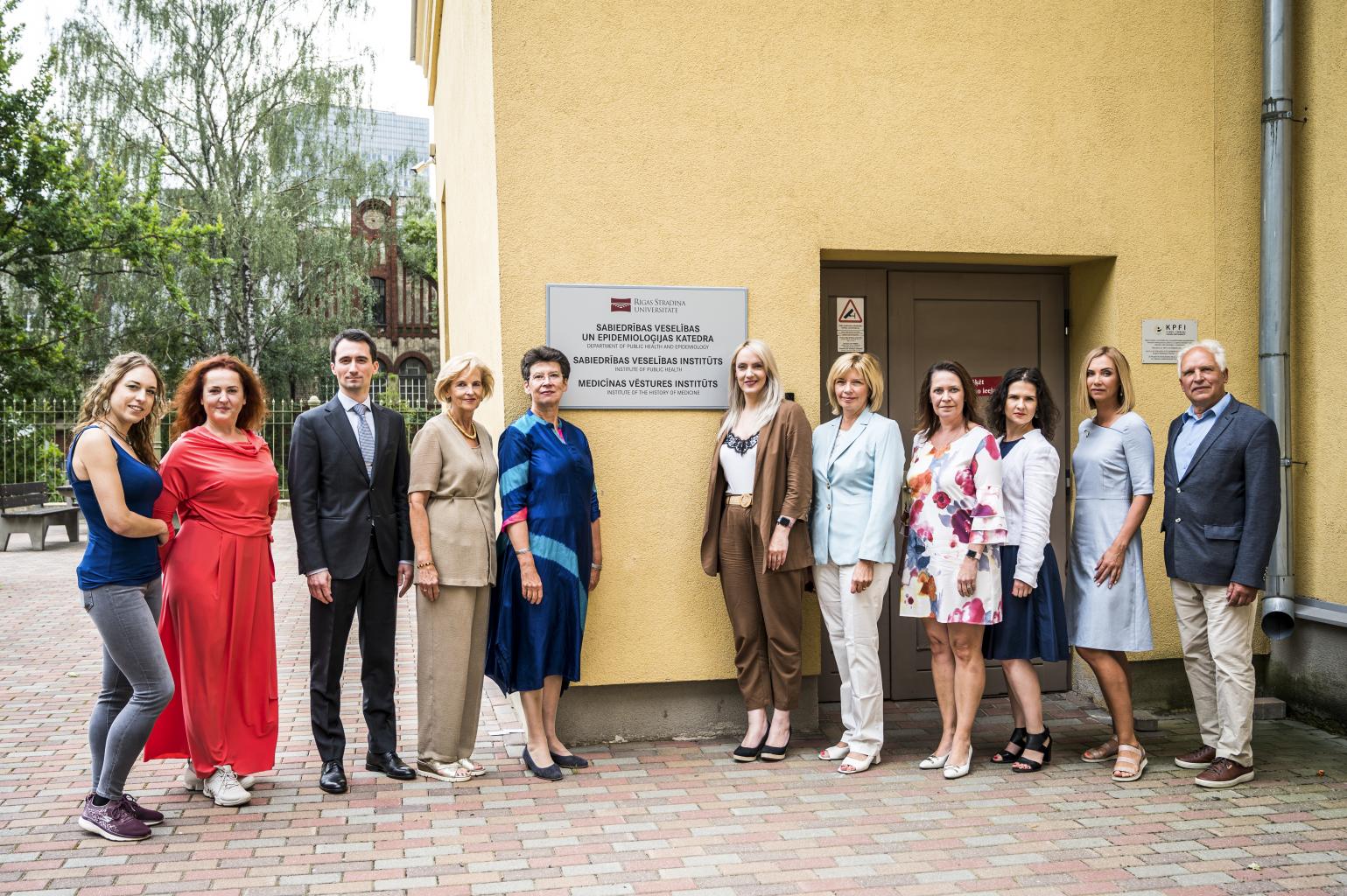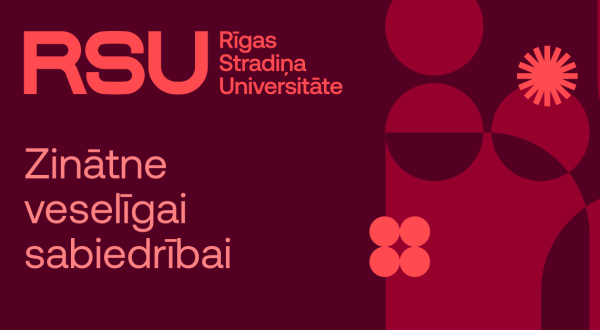‘Public Health is a National Security Issue’: Interview with Assoc. Prof. Ķīvīte-Urtāne on the Anniversary of the Institute of Public Health
More than four million euros allocated to research, 13 projects implemented and 13 more in progress, 93 scientific publications, 165 abstracts and conference articles – this is the summary of the achievements of the Rīga Stradiņš University (RSU) Institute of Public Health that celebrated its fifth anniversary on 21 November.
Over the years, the team has grown to include 26 professionals whose expertise is sought out by the government and key institutions of the healthcare sector, as well as the World Health Organisation (WHO), for which the institute is expected to become a hub next year. Anda Ķīvīte-Urtāne (pictured), Associate Professor and Director of the Institute of Public Health, talks about what has been achieved so far and about the institute’s future.

Do these five years of development feel like a lot or little for the institute?
Compared to established and internationally renowned scientific institutes, five years is very little. Viewed in this context, we are still if not quite an infant, then at least a toddler. On the other hand, a lot has already been accomplished since the idea of the institute was conceived of by Asst. Prof. Daiga Behmane and since it started its activities under the leadership of Prof. Gunta Lazdāne. When I arrived on the bridge, the ship was already on a steady course in international waters thanks to both Prof. Lazdāne and Assoc. Prof. Behmane, and to the whole team of the institute, which has grown and changed over the years.
What was the pandemic like for the institute?
COVID-19 is a public health tragedy marked by particularly high mortality in Latvia, but it was also a period of rapid development for the institute. We have provided expertise to the government and various industry institutions as well as to the media. We also carried out research, including as part of the national research programme to mitigate the effects of COVID-19. Some of the most brilliant minds in public health in Latvia worked with me on the team I led on the COVID-19 project Impact of COVID-19 on Health Care System and Public Health in Latvia; Ways in Preparing Health Sector for Future Epidemics. I took the lead because I could see the passion in their eyes. I often saw the exhaustion in my colleagues’ eyes, but also the satisfaction – they realised that this project gave them an opportunity to be in at the beginning of new discoveries and paradigms that will be researched for decades to come after the pandemic.
Researchers from the institute also worked on a project led by Professor Uga Dumpis Multidisciplinary Approach to Monitor, Mitigate and Contain COVID-19 and Other Future Epidemics in Latvia. There were no COVID-19 vaccines in Latvia at that time, but the public perception was that a large proportion of people had already contracted COVID-19 without knowing it. This large-scale project involved the University of Latvia, RSU, BIOR, and 125 Latvian GP practices. It found that SARS-CoV-2 antibodies had not been detected in a large proportion of the Latvian population; at that time, only about 12% tested positive for the antibodies. It was essential to dispel the myth that COVID-19 wasn’t a serious disease that people wouldn’t even notice if they contracted it.
Despite the work public health experts and epidemiologists put in to explain the pandemic, Latvia stood out because of the number of people who were against the vaccines and who denied the severity of the new virus. What was this period like for the experts? I assume that there was no shortage of opposition.
Informing the public, giving interviews, and advising the media one point became a second job. I think any researcher will confirm that the biggest challenge in dealing with the media is to condense what you have to say into a few minutes. Especially when it comes to a half-million-dollar project that covers five major sub-projects and topics such as children and COVID-19, public mental health, sexual and reproductive health, seniors, and the impact of the pandemic on the health care system. This phase has hardened us considerably. However, all the work we had to put in to explain the situation also had a grave side effect: we endured an enormous wave of aggression that reached us in different ways from messages on social networks to e-mails and calls threatening me and my family. I was expecting my third child during the pandemic. It was not an easy period with all the aggression in the background.
What is the current situation with COVID-19? I suppose it is no longer the main focus of the institute’s agenda.
The end of the pandemic has not yet been announced. COVID-19 is still something to study and report on, but on the public agenda it has understandably been replaced by the Russian war in Ukraine. Prof. Ģirts Briģis said in an interview: ‘War and plague go hand in hand.’ In this context, we at the institute would like to see public health issues appearing alongside military security in Latvian national security documents. International experts recommend including public health and climate issues in national security documents, but there are a few places in the Latvian national security documents where climate is mentioned. Public health does not appear at all even though we all felt the severity of these issues at the height of the pandemic and several times we were afraid that stones would fly through the windows of the Saeima. Pushing public health on the national security agenda is an ambitious but necessary task.
What are the current directions on the institute’s agenda?
The field of public health is broad and we cover many areas. We have four main research areas at the moment: 1) to improve the healthcare system, including patient-centred care, and value-based concepts of healthcare, 2) healthy ageing and well-being policies, 3) sexual and reproductive health, 4) health-promoting habits.
From next year, the Institute is expected to become a WHO Collaborating Centre. This will be one of our upcoming developments. It means that we will develop as a regional centre of excellence. If any WHO member state needs methodological or substantive support, we will provide it. At the same time, Latvia will then also have direct access to WHO resources. This will also bring growth opportunities for our researchers, who will be able to travel on missions to WHO Member States as consultants or advisors.

Talking about the path forward, what do you see in the next five years?
I think we will work a lot on sexual and reproductive health. There are major studies underway and ongoing projects such as the national sexual and reproductive health study led by me and Prof. Lazdāne or our international study on changing screening strategies for human papillomavirus and cervical cancer. These topics are unfortunately still quite stigmatised in Latvia, which is why it is important to develop them. We also pay too little attention to the issue of healthy ageing. We have one of the worst healthy life expectancy rates in Europe. The saying “living too short and dying too long” is true for Latvians, but it should be the other way around. This year, Asst. Prof. Aija Bukova-Žideļūna will be responsible for the research on healthy ageing. We also have excellent research in progress led by Assoc. Prof. Behmane on the development of health systems, on health economics, and on digital healthcare; by Assoc. Prof. Elita Poplavska on access to medicines; by Assoc. Prof. Laila Meija on nutrition and food system sustainability; as well as by Prof. Anita Villeruša and Assoc. Prof. Inese Gobiņa on health habits of schoolchildren. It is also important to continue the work in the field of mental health, where there is excellent cooperation between RSU psychiatrists led by Prof. Elmārs Rancāns and health psychologists, led by Prof. Kristīne Mārtinsone. Overall, we will continue to cover a wide scope from pregnant women to newborns, and adolescents to seniors.

The Institute of Public Health in the summer of 2022
I think that in the near future we will be able to strengthen the institute’s international profile. We are currently recognised nationally and are seen as partners by both public institutions and private entities such as pharmaceutical companies, but we are focused on international development, working on new international project applications, scientific publications, and organising international conferences. The next such event will take place on 13–14 December, when RSU will host the EECA INTERACT 2022 Scientific Workshop on HIV, Hepatitis C and Tuberculosis in Eastern Europe and Central Asia. Together with an international group of researchers, we will address HIV, viral hepatitis B and C, tuberculosis, and, to some extent, also COVID-19.
Strategically, I think it is important for us not only to respond to demands and tenders in the future, but to shape the public health agenda on a national level. My vision for the future of the institute is associated with consolidation into defined sub-sectors, each with its own leader and team. But first it is essential to bring the broad family of the institute together, not only on paper but also in practice. The ever-changing home of the institute, the pandemic, and the remote and semi-remote working arrangements that it brought have taken their toll – people need to feel more connected to the institute and to each other. This will help turn dreams into reality more quickly.
The RSU Institute of Public Health Celebrates its Fifth Anniversary
Related news
 Step towards athlete safety and fair competition: RSU researchers contribute to creation of largest microclimate data network at Olympic GamesConsolidation, Sports research, Public Health
Step towards athlete safety and fair competition: RSU researchers contribute to creation of largest microclimate data network at Olympic GamesConsolidation, Sports research, Public Health


